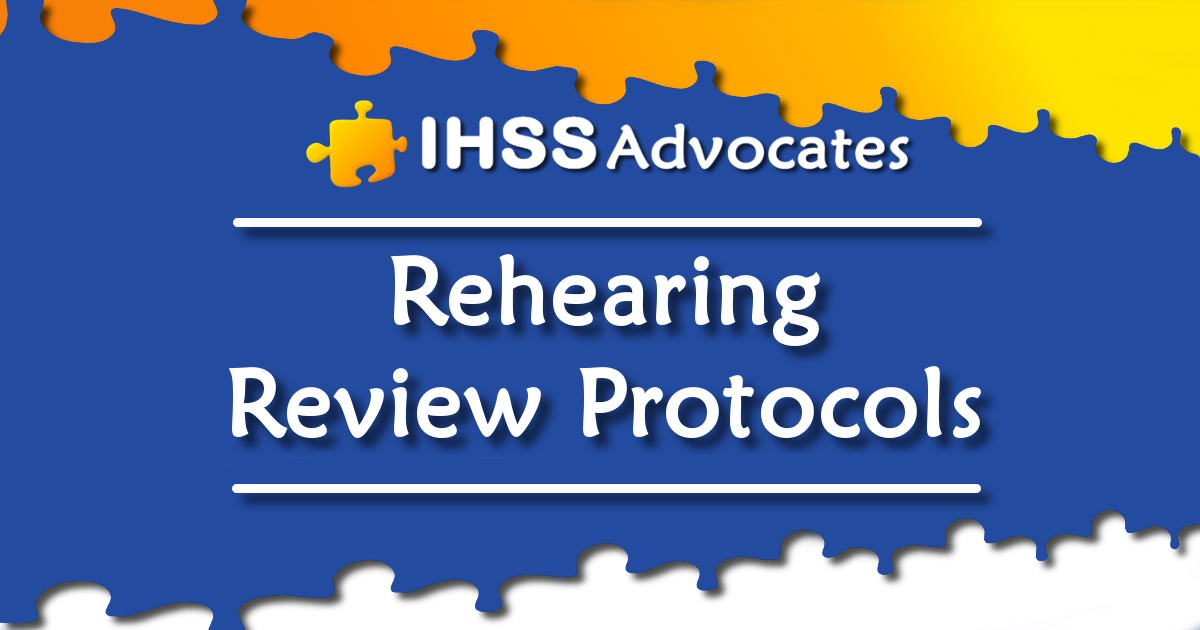Rehearing Review Process/Protocols
If you’ve been denied IHSS and you believe the decision was unfair, inadequate, legally and/or factually incorrect, the first step to appeal the decision is to request a rehearing. The Rehearing Review Protocols document provides you with an overview of the laws governing the “rehearing review process” that rehearing reviewers should consider. It also provides a six-step guide to the process. The ultimate decision as to whether a rehearing is granted rests with the Director, acting through the Chief Administrative Law Judge (CALJ) as his/her designee.
The rehearing review process begins when a request for rehearing is received in Sacramento by the State Hearings Division’s (SHD) Rehearing Unit. A non-ALJ Rehearing Unit analyst reviews the request, notifies the parties in writing that the request has been received, enters the request into the rehearing database, and adds the request and any rebuttal received to the file previously assembled for the case. To ensure that the claimant receives the rehearing determination, the notice indicates that the claimant must inform the Rehearing Unit if his/her contact information changes before he/she receives the determination. The file is then sent to an ALJ Specialist for review.
Deadlines
- You must file, to the director, within 30 days after receiving the decision.
- The director shall grant or deny your request no later than the 35th working day after the request is made.
- Rehearing decision must be adopted within 60 or 90 days from the date the grant letter is mailed.
Grounds for granting a rehearing (Section 10960, subdivision(b))
- The adopted decision is inconsistent with the law.
- The adopted decision is not supported by the evidence in the record.
- The adopted decision is not supported by the findings.
- The adopted decision does not address all of the claims or issues raised by the parties.
- The adopted decision does not address all of the claims or issues supported by the record or evidence.
- The adopted decision does not set forth sufficient information to determine the basis for its legal conclusion.
- Newly discovered evidence, that was not in custody or available to the party requesting rehearing at the time of the hearing, is now available and the new evidence, had it been introduced, could have changed the hearing decision.
- For any other reason necessary to prevent the abuse of discretion or an error of law, or for any other reason consistent with §1094.5 of the Code of Civil Procedure.
Bases for denying a rehearing request
- No Good Cause for Failure to Submit Evidence
- Untimely Filing Without Good Cause or Equitable Reason
- No Rehearing Available for Compliance Issues
- No New Unavailable Evidence
- No Abuse of Discretion on Fact Finding
- The Findings Are Supported by Substantial Evidence
- No Mistake of Law or Policy
- No Prejudicial ALJ Error in Conduct
- No Failure to Consider Evidence
Download The Six-Step Guide to Rehearing Review
Step One: Is there Substantive Jurisdiction to Review the Issue?
As a substantive matter, some types of state hearing decisions are not subject to rehearings. Thus, the rehearing reviewers must first determine whether the hearing decision at issue falls outside the scope of rehearing review.
Step Two: Is the Rehearing Request Timely?
Like the substantive considerations discussed in step one, the rehearing review process lacks jurisdiction to consider untimely rehearing requests. However, good cause for filing a late rehearing request can be considered under the statutory criteria discussed below.
Step Three: Substantive Errors: Errors of Law Versus Errors of Fact
Assuming that the rehearing request is timely and should be evaluated on the merits, rehearing reviewers must next decide whether the decision under review contains a substantive error related to the request
Step Four: Harmless Error Analysis
When errors in decisions are identified, rehearing reviewers must undertake a fourth step, and decide whether the errors are sufficiently important to warrant a rehearing.
Step Five: Putting the Analysis in Writing
After a rehearing reviewer decides whether to recommend a rehearing, as part of the deliberative process, the reviewer’s analysis and recommendation is put in writing and entered into the rehearing database.
Step Six- Notifying Parties of the Rehearing Determination
The final step in the review process involves drafting the letter to the parties, notifying them of the disposition of the rehearing request.
If you need any assistance, you are welcome to join our support group at: IHSS Advocacy Group

